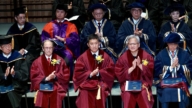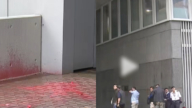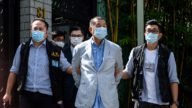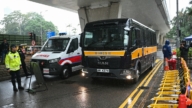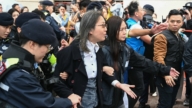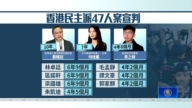【新唐人2011年6月15日訊】這個月10號開始的廣州增城新塘大規模衝突,還在持續當中。據香港媒體報導,14號,氣氛仍舊肅殺,到處都是衝突之後的痕跡。大批荷槍實彈的軍警在街道列隊巡邏。當局至今仍然沒有向外界真正公開情況,反而聲稱事態已經受到控制。
增城新塘鎮衝突,到15號為止已經進入第5天。此前,經過連續三晚的大規模衝突後,當局出動解放軍鎮壓清場,大舉搜捕四川民工。
香港《東方日報》報導,新塘有近萬軍警嚴密防控,白天有上千全副武裝的武警上街步操示警,晚上則繼續宵禁。網上流傳13號凌晨軍警拘捕千人。不過,當地警方說只拘捕了150人。
目前,有媒體報導認為,新塘事件是本地人和外地人之間的矛盾衝突。但是,在經濟發達的廣東,近年頻頻發生大規模抗議示威,學者認為並不是偶然。
草庵居士(經濟評論家):“這些暴亂都出現在經濟發達地區,這是一個特點﹔第二個特點,民眾對官方的一個極大的反抗,而且年輕人比較多﹔而第三個特點,所有這些問題的產生,一個是產生在拆遷問題上,一個是產生在年輕的產業工人上。”
草庵居士表示,中國最近這幾年經濟雖然有所發展,但是,這個發展在很大程度上是建立在對貧困勞動階層的盤剝上。
草庵居士:“產業工人也好、貧困的百姓也好,他們在受到盤剝跟剝削非常嚴重,造成中國嚴重的兩極分化,而這種經濟發展所帶來的不平衡發展,就會造成很多的怨氣。民眾沒有辦法去實現自己的理想,即使你是很聰明能幹,由於你的出身不好,或者你的家庭背景不好,你沒有辦法正常去競爭。”
香港媒體報導,資料顯示,廣東外來民工有2000萬人,主要集中在珠三角的外資或出口型企業。新塘靠近廣州,製造業發達,有大量牛仔服裝山寨廠,有「牛仔褲之城」之稱,大批外地農民工湧到新塘打工謀生,大部分為四川人,佔當地人口近半。
《路透社》在早前報導,受通脹、利率上調及人民幣升值等多重因素衝擊,下半年中國將會有40%的中小企業面臨停產、半停產,甚至倒閉。這個現象使得收入就不高的上千萬民工,收入下降甚至失業,生活大受影響。
同時,新塘的外來民工反映,還經常受當地政府制定的政策歧視,很多人享受不到當地福利,子女教育也被另冊對待,甚至連買摩託車上牌、辦暫住證等,都要受到諸多不合理限制,或者要比當地人付更多的錢才能辦理。
大陸經濟專家:“使用公權的階層的,它傾向於向民間掠奪經濟收入,以抵補他們在通貨膨脹中造成的心理恐慌。他們向民間撈錢,不罰款的要罰款,隨便甚至顛倒黑白,這樣肯定會激化社會矛盾。”
除了新塘事件,同樣在廣東發生的潮州民眾示威抗議,剛過去一週, 網民們發現,身為廣東省委書記汪洋並沒有作出任何反應。
據大陸媒體的報導,汪洋率團去了德國考察當地經濟和社會管理﹔廣州市委書記張廣甯則率團到菲律賓推介「新廣州」。而廣州市長萬慶良,在新塘民眾抗議最緊張的12號,還在水中扒龍舟。
新唐人記者梁欣、李靜、薛莉採訪報導.
Xintang Crisis and Polarization
The large-scale conflict in Xintang in Guangzhou
occurred on June 10 and continued for several days.
Hong Kong media reported that on June 14,
military police were still patrolling the streets.
However, Chinese Communist Party’s (CCP) media
haven’t revealed the real situation so far.
They only claimed that the situation was under control.
The Xintang incident continued on June 15.
After 3 days of clashing between workers and police,
CCP’s Liberation Army was dispatched to suppress
and hunt down migrant workers from Sichuan.
As per Hong Kong’s Oriental Daily,
Xintang is guarded by nearly 10,000 military police,
who patrol the streets. At night, curfew is imposed.
Over 1,000 are rumored to have been arrested.
Local police claimed that they had only detained 150.
Some media believe that Xintang incident to be
a conflict between the locals and non-residents.
In prosperous Guangdong, protests occur frequently.
Scholars believe that this is not a coincidence.
Caoan Jushi (Economic Critic): First,
the riots take place in economically advanced regions.
Second, protesters oppose the authorities,
and typically a lot of young people are involved.
Third, these problems are caused by forced demolitions
or they are related to young industrial workers.
He says, China’s recent economic development
has been built on the exploitation of poor laborers.
Caoan Jushi: The exploitation of workers and citizens
caused the polarization in China and grievances.
The masses have no means to realize their aspirations.
Regardless of individuals’ intelligence or capability,
family backgrounds lead to unfair competition.
As per Hong Kong media, there are 20 million
migrant workers in Guangdong. They concentrate in
foreign-invested or export firms on Pearl River Delta.
Xintang, close to Guangzhou, is known as “jeans town”
because of its large industry of jeans manufacturing.
Most migrant workers in Xintang are from Sichuan.
They are about half of the local population.
As per Reuters, 40% of small and medium firms
in China would cease production or go bankruptcy
in the second half of 2011.
It will negatively impact millions of migrant workers
with reduced pay or even loss of employment.
Migrant workers in Xintang say that
they are discriminated by local government policies.
Many have no benefits. Their children are mistreated.
They face many unreasonable restrictions even to
get license plates and temporary residence permits.
Often, they have to pay more than the locals.
Chinese economist: The officials with power
rob the public to console their own fear of inflation.
Their robbery of people’s money and unfair fines
will consequently trigger social conflicts.
Apart from Xintang, another protest in Chaozhou,
Guangdong, took place a week ago.
Netizens noticed no response from Wang Yang,
the CCP secretary of Guangdong Province.
As per Chinese media, Wangyang went to Germany.
Guangzhou committee secretary Zhuang Guangning
went to Philippines with a business delegation.
Guangzhou mayor Wan Qinliang went dragon boating
on June 12, when Xintang incident was at its peak.
NTD reporters Liang Xin, Li Jing and Xue Li



